- Home
- Tony Roberts
The Commissar Page 13
The Commissar Read online
Page 13
It was chilly. Casca’s breath floated over his head as he pushed on through the trees. He stopped, his legs on fire, and sat down against one of the tree trunks. He would need food pretty soon, for the sub-zero temperature was sending chills through his body and he’d need fuel for the journey further south – unless of course he found somewhere to hole up in the meantime.
That sounded more appealing. But food was scarce, and what there was around was being taken by the Soviet to feed their troops. Maybe a raid of a Red Army depot? He couldn’t go back to Belgorod, so he may as well push on further south. God alone knew how far the front was being pushed but he guessed a long way, for the Ukrainians weren’t able to put up much of a fight at the moment.
Snow began to fall. Much of it was blocked by the canopy above but some inevitably fell through, and he trudged on, head bowed, rifle over one shoulder. His greatcoat kept him warm, but he needed some headwear and was regretting throwing away his hat now.
The trees thinned and he squinted through the falling flakes into the distance. It seemed to be farmland of some kind, and maybe a hovel or two in the dip ahead? He glanced left and right but nobody was moving about – who would in this weather? – and began to push through the powdery snow and towards the collection of wooden buildings ahead. They looked like they were huddled in a slight dip where a watercourse wriggled through the land, and animal pens and runs adjoined each construction.
There was a barn, and storage sheds, too and the smell of dung and animals reached him before anything else. Then the smell of burning wood smoke. A fire! Yes, he needed that.
He edged into the barn, a poorly-maintained structure with some hay in it. A couple of cows munched miserably on a bale and peered at him out of the corner of their eyes. Casca kept away from them and sat on an upturned pail and looked out through a gap in the warped planking. At least he was free of the wind here which was a relief.
He kept on shivering and hunger gnawed away at him. An hour or so later he saw people moving from one building to another, checking on the beasts and getting water from the stream. They were breaking ice and putting that in their pails or dipping them through the hole and getting water that way.
He assessed the people he saw and judged that a solitary woman would be the most likely to take him in. He didn’t want to impose on a family, and the men were more likely to see him as a threat or danger. A lonely woman would be more inclined to take pity on in. A little exploitative, perhaps, but he needed food and warmth, and she would need company and someone to protect her and to do manual work around the place.
He would stay until the spring if he could, then he would have to move on. Unless, of course, the Communists found him first.
CHAPTER FOURTEEN
At first Raisa Marchenkova was suspicious of Casca, and after all, why wouldn’t she be, so Casca reasoned. Here in a land of civil war where each side was intent on killing as many of the opposition as possible, even if they belonged to your family, so any man in uniform was to be viewed with fear.
Casca, though, reassured her he was not on any side now he had deserted the Reds. He told her he needed shelter for the winter and would be gone in the spring. In the meantime he would get her firewood from the forest and carry out any repairs to her house which was showing signs of neglect.
She told him the usual story. Her husband had actually survived the Great War but on his return to the village – he had deserted when Bolshevik propaganda had destroyed the army – he had thrown his lot in with the Communists.
Unfortunately this had brought him in conflict with some of the more conservative elements of the village who were more traditional Christian-orientated people who abhorred the atheistic Reds. In an argument over politics in the village hall things had gotten heated and her husband had shot someone in the heat of the moment.
That had ended up with him being hanged and Raisa cold-shouldered by the rest of the community. She would have left but for the fact she had nobody to go to; she was from the Crimea and that was in the hands of the Whites. She had welcomed the news that the area was once again in the hands of the Communists but since the village was so small, nobody really took much notice of them. They were too busy fighting the enemy, whether it be the UPR or the Whites of Deniken.
Come the peace then they’d soon discover what sort of rulers the Reds were. Casca kept quiet about that. He asked her whether his presence here would cause difficulties with the other villagers and Raisa didn’t know. She was ignored by the others and left to her own devices.
Casca soon discovered that he was treated with contempt by the rest. He tried to get some furs from the hunter, so he could make something warm out of them, but the man refused to sell anything to him. “You’re with that Marchenkova woman,” he said, spitting into the ice. “She’s a Red.”
“I don’t think she is,” Casca countered. “Her late husband was, but that doesn’t mean…”
“She’s the same. A woman is tainted by what her husband did. You a Red, too?”
“Not any more. I was, but I got sickened by their blood thirsty habits.”
“Bah, see? You’re just as bad. I won’t sell to you or your kind.”
“Well I’d be careful about saying that out loud, friend. They control this area and when they come, and they will, if you say that kind of thing they’ll take you into the forest and shoot you. They won’t give a damn about you, got it?”
“You’re not welcome here, go away. Take that bitch with you, too. Good riddance to bad blood.”
His attitude was typical of the people there. But as it was winter and there was no going anywhere anytime soon, Casca contented himself with hunting and wood gathering in the forest. Raisa was typical of the Russian peasantry; practical and a mistress of improvisation. Soups were plentiful, using the remnants of vegetables and scraps of meat in her broths.
Casca ate sparingly. His constitution was such that he could utilize every morsel and turn it into energy or heating for his body. Not one bit was wasted. Raisa soon relaxed in his company and it wasn’t long before she invited him into her bed. She needed his comfort and reassurance, and warmth, too. Also she rediscovered what it was to love and show her passions.
His scars fascinated her. “Roman, what in the name of God happened to you? Some of these wounds should have killed you, I’m sure.”
He chuckled in the dark of the night. Here, the nights were long and cold and so they spent a lot of time in bed. Not a bad way to pass the Russian winter. “Torture is not a pleasant experience, Raisa,” he said enigmatically. “Shall we say I received these scars from people who are no longer alive?”
She stared at him from close up, her eyes wide. Although he couldn’t see her features that well, he knew her deep brown eyes would have been a mesmerizing sight. Although not a classic beauty, she had her charm and attractiveness. He loved the way her hips rolled when she walked, for example. She was a no-nonsense down-to-earth type that he liked. No bullshit. “It must have been horrible.”
He ran a hand down her face. She had those high Slavic cheekbones he adored. “In a Civil War there are deep emotions that give an extra edge to the normal hatreds. So, if I fall into the hands of the Reds I’m sure they won’t be sympathetic. I killed a Commissar and a member of their Committee in Belgorod.”
“Then they will hunt you down when the snows melt. They will not rest until they find you.”
“So that is why in the spring I will have to leave and go south. I have to get away from them.”
She rested her head against his chest, saying little. Often after they had made love she did this, finding comfort in his warm body. “I do not wish to remain here on my own with these people. They have made my life intolerable since Sergei returned from the Front professing his support for the Communists. I’m sure they will do something awful to me before long. And now you’re here with me they are even more angry.”
“Then when I leave you come with me. The Crimea, you say?”
> She nodded. “My family is from there. I no longer know if they are still there but I wish to return there. Dzhankoy, you know of it?”
“No, but we’ll find it, don’t you worry.”
They made their plans to leave, setting a day in March when the melting would come and the Rapistuta would render vehicles useless in the thick, cloying mud. Walking across country would be easier. The only danger would be in the form of cavalry and the Cossacks. Some Cossacks had sided with the Reds, some with the Whites, and others yet again with their own people around the Sea of Azov.
Events seldom fell as one would plan, and for Casca this was ever true. It had made him flexible. Therefore when, on one particularly freezing day in early March when a squad of soldiers turned up at the village, requesting that food be handed over to them, that Casca had to make his move.
There were ten of them; eight soldiers, an officer and a commissar, directing them to show no mercy. He would be the first to be taken out. Casca still had his Nagant and made sure it was loaded, then waited till the knock on the door came. Raisa was waved back deeper into the house.
He opened the door. “Yes?”
“In the name of the Soviet,” the commissar said, puffing his chest out, “I order you to allow troops of the Revolution into your house to search for food supplies.”
“And if I refuse?”
“You will be shot.”
“You idiot whoreson,” Casca snarled, drawing his Nagant on the commissar’s chest. “Fuck you!” and shot the man dead.
The two soldiers with him gaped in shock. Before they could react Casca’s muzzle had swung on the right hand one.
“Fuck your Revolution!” and he drilled the second through the forehead, blowing his brains out all over the street.
The last man desperately grabbed his rifle but the pistol was already aimed straight at his heart. From ten feet he was blasted away onto his back.
Casca crouched by the dead commissar and pulled out his Nagant. Now armed with two pistols he advanced down the street. He’d seen two more go into the next house and they came clattering out, rifles in their hands, and they died on the steps to two more accurate shots, but the range was ridiculously close.
Five. Five left.
Shouts went up. What villagers were left outside quickly ran to their homes. A soldier came sprinting into sight, rifle at the ready. Casca went down on one knee and steadied his aim. The soldier blasted a shot that passed close to Casca but too high.
Typical inexperienced soldier. Casca took his time, drawing a careful aim. One shot pitched the Red over and the man rolled into the center of the street. The Eternal Mercenary got up and ran to the corner of the house, peering around into the main square, which wasn’t really a square, but rather a space where the people gathered for discussions. The stream ran through here, too, and one narrow wooden bridge spanned it.
The small chapel on the far side was where three villagers had been lined up by the officer ready for execution, but now he waved the three men with him, the last of the Soviet squad, to take care of the enemy.
The three went running over the bridge and Casca ran at them, thinking how stupid they were. Bunched together, he could hardly miss. He blasted six shots, cutting all three down. Two fell into the water while the last lay on the bridge, eyes staring up into the sky, one arm dangling over the side.
The officer had his own pistol and now shot at Casca. One bullet came close, striking the near bank, but the Eternal Mercenary was in no mood to exchange long-range fire with the man. He zig-zagged over the bridge, jumping to one side as he crossed so he landed on the bank, and sprinted up the other way.
Two shots blasted past him as the officer began to panic. The three condemned villagers scattered, two into the chapel to pray for deliverance. The distance closed to twenty feet. Close enough.
One pistol was empty, the other had two bullets left. Casca’s first shot struck the Red in the shoulder, sending him spinning and striking the wall of the chapel hard. As he slid down, leaving a faint red smear on the stonework, Casca came walking up to him.
“Greetings, Whoreson,” he said, aiming his pistol at the sweating man. “Going to do some valiant work for the good old Soviet, were you? Shooting helpless villagers your kind of soldiering, is it?”
The officer gritted his teeth. “Enemies of the Revolution.”
“No. The Revolution is the enemy of the people,” Casca corrected him. He aimed at the sitting man. “And this is what I think of you Communists.” He blew his head apart.
Two empty pistols. Great. Lucky all the Reds were dead.
He walked back to the house and Raisa, who was peering fearfully out of her window. She came out in relief at his return. “Oh, thank God you’re alive!” They embraced.
He nodded at the bodies. “Time to pack and be out of here. The price on my head just went up a few million rubles I think.”
The villagers stood dumbly as Casca and Raisa walked through the village, a few belongings in their arms. Casca also held one pistol in his right hand, reloaded, just in case.
The village spokesman came forward. “What now? We will be punished for this! You have killed us all!”
“Then do something about it. Stop whining sitting on your ass bemoaning your sad lot in life. Unless you get up and do something, nothing will change for you.” He walked Raisa to the truck that the Reds had arrived in, engine still running, half-turned by the edge of the settlement.
Nothing to it but to drive as far as they could south, then try to make it on foot the rest of the way. As they drove south, down the frozen mud road towards Kharkov, Casca glanced at the white-faced woman sat alongside him. The wind was bitingly cold, even with the windscreen up. Not having any doors to keep the cab enclosed didn’t help. The thin, narrow treads of the truck didn’t help either, and Casca had to fight in keeping the thing on the road as it threatened to slide off to either side.
“So, I’ve never asked you before, but how come you and Sergei ended up back there in that damned hole? I mean, if you came from the Crimea and he came from, where, Kiev?”
She exhaled a sharp breath, probably in amusement, he guessed. He couldn’t see much of her, swathed as she was in a scarf and her furs, muffled up to the eyes. “He was a young, dashing man in the army, a lieutenant. Yes, you didn’t know that, did you? You thought he was just an ordinary soldier.”
Casca grinned. “Guess I did. Apologies.”
Raisa peered ahead. “He swept me off my feet. He was stationed in my hometown, and we had a whirlwind romance. I was seventeen, he nineteen, and fresh out of the academy. Not destined for promotion though; he was too talented and the Tsarist regime didn’t like people like him, as he would show the idiots in charge to be the morons they were if he were to be promoted, so they kept him down, like all men of talent.” She sounded bitter.
“So what happened?”
“Oh, the war came. I was pregnant and we were not married. My parents were scandalized and said I should get rid of it or marry him. I didn’t want to send my baby to some orphanage so I did marry him, but I was happy to leave my parental home, for what the sort of people they were like.”
“And you had to find a place to live, yes?”
“Oh, we did. But the war went bad and I lost the child. Miscarriage.” She went silent and looked out of the open cab across the white of the countryside. She was allowed to speak when she wanted to, and after a long period of silence, she did. “I ended up in that damned village, as his pay had stopped and we couldn’t afford to live in a city, especially with the riots and revolution imminent.
“Sergei was especially bitter about the war and the Tsar and spoke out against him and his regime. He joined the Bolsheviks and was shunned by the rest of the village because of it. Then he got into an argument in the village and the rest you know.”
Casca grunted. He was busy concentrating on the road. It was badly rutted and the truck was struggling to keep on the surface. As evening drew
on, his strength began to fade and a momentary lack of concentration ended with the truck sliding off-center and one wheel buckling, then tearing off. The vehicle ended up in the field to one side, over on the driver’s side. Casca was pinned underneath a screaming Raisa, out cold, from a blow to the head.
CHAPTER FIFTEEN
Casca came around lying on the freezing cold ground. His head throbbed like it was the mother of hangovers. At first he thought his sight was affected, then he saw it was night. Damn – how long had he been out?
Raisa put a bottle to his lips. “Drink.”
He did so, grimacing. “How long have I been out?”
“Thirty minutes perhaps. You were a bastard to get out of that truck. In the end it was easier to roll it further into the ditch and you fell out. It was on the point of tipping over anyway, and after I climbed out it nearly overturned. You were trapped in there and I was afraid it would burst into flames.”
Casca saw he was alongside the smelly truck, oil and other fluids dripping from it. They were in the roadside ditch and the road itself was above them, five feet or so. “I think I’d best get up,” he said. She assisted him and he stood groggily for a moment, then orientated himself. “South, I think, wasn’t it?”
“In the dark?”
“I suppose we could camp for the night. What of our stuff? Is it salvageable?”
“Yes, and there’s more from the back,” she said, pointing to a pile of army issue blankets in a pile by her feet.
Casca grinned. “Nice work.” He checked both his pistols were there and with a satisfied grunt, picked up the bigger pack and led her away from the truck. She questioned as to why they were going away from the road and crashed truck, and he waved into the dark. “If a patrol happens by, its best we’re nowhere in sight.”

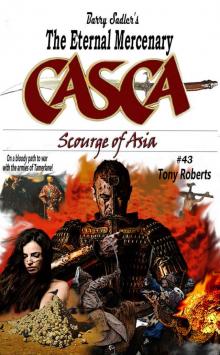 Casca 43: Scourge of Asia
Casca 43: Scourge of Asia The Lombard
The Lombard Casca 49: The Lombard
Casca 49: The Lombard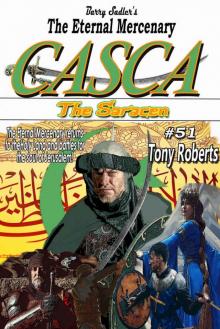 The Saracen
The Saracen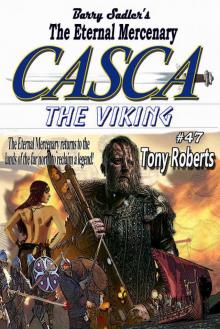 Casca 47: The Viking
Casca 47: The Viking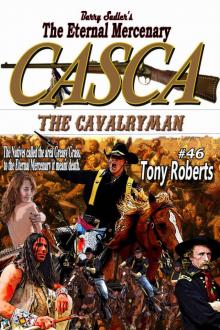 Casca 46: The Cavalryman
Casca 46: The Cavalryman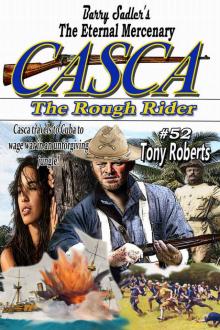 Casca 52- the Rough Rider
Casca 52- the Rough Rider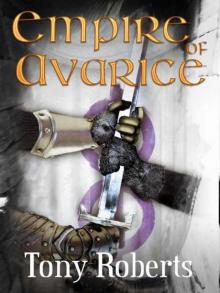 Empire of Avarice
Empire of Avarice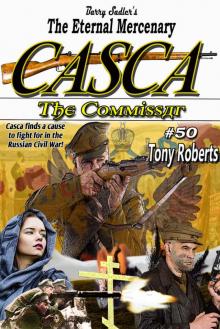 The Commissar
The Commissar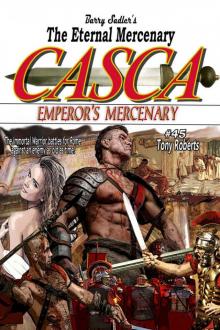 Casca 45: Emperor's Mercenary
Casca 45: Emperor's Mercenary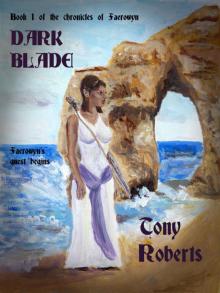 Dark Blade
Dark Blade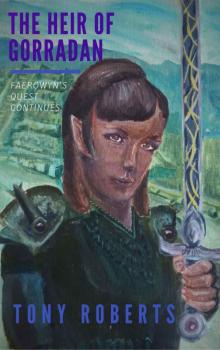 The Heir of Gorradan (Chronicles of Faerowyn Book 2)
The Heir of Gorradan (Chronicles of Faerowyn Book 2)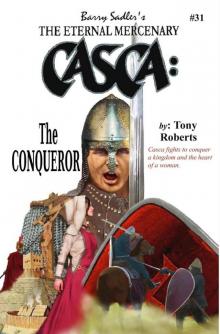 Casca 31: The Conqueror
Casca 31: The Conqueror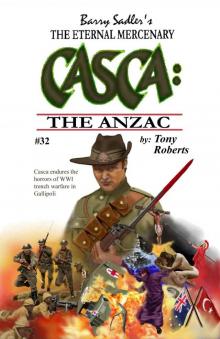 Casca 32: The Anzac
Casca 32: The Anzac The Anzac
The Anzac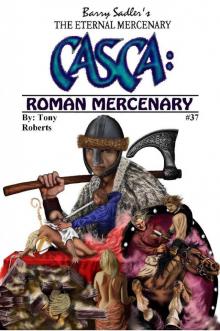 Casca 37: Roman Mercenary
Casca 37: Roman Mercenary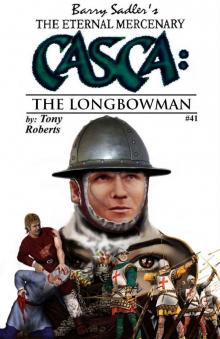 Casca 41: The Longbowman
Casca 41: The Longbowman The Longbowman
The Longbowman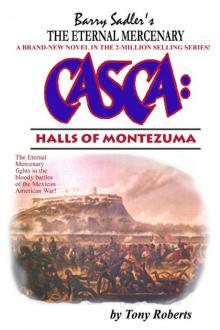 Casca 25: Halls of Montezuma
Casca 25: Halls of Montezuma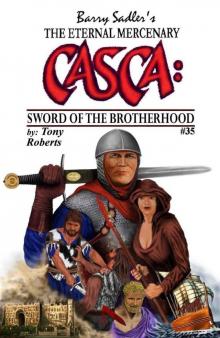 Sword of the Brotherhood
Sword of the Brotherhood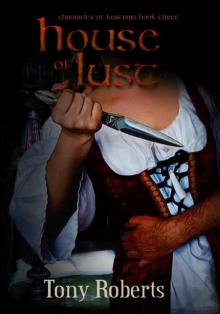 House of Lust
House of Lust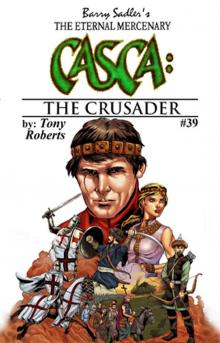 Casca 39 The Crusader
Casca 39 The Crusader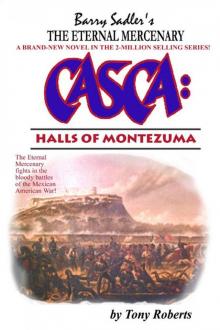 Halls of Montezuma
Halls of Montezuma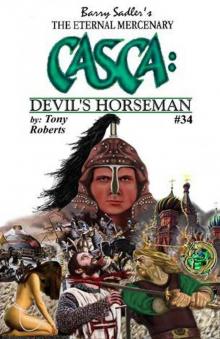 Devil's Horseman
Devil's Horseman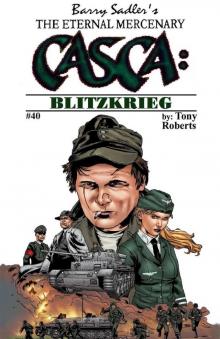 Casca 40: Blitzkrieg
Casca 40: Blitzkrieg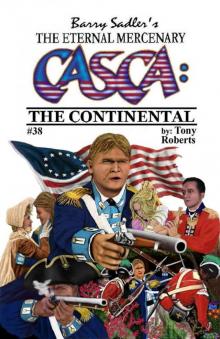 Casca 38: The Continental
Casca 38: The Continental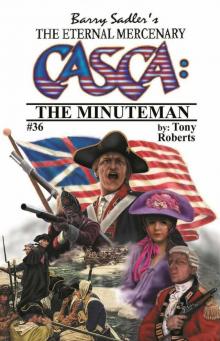 The Minuteman
The Minuteman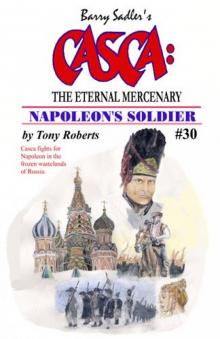 Napoleon's Soldier
Napoleon's Soldier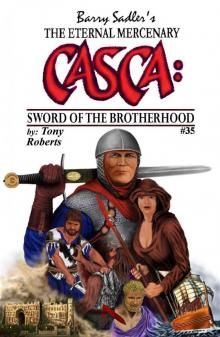 Casca 35: Sword of the Brotherhood
Casca 35: Sword of the Brotherhood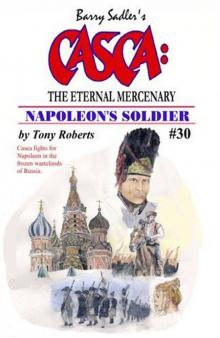 Casca 30: Napoleon's Soldier
Casca 30: Napoleon's Soldier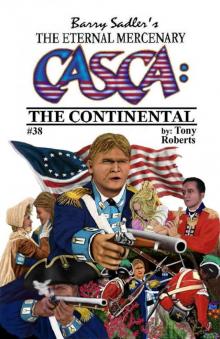 The Continental
The Continental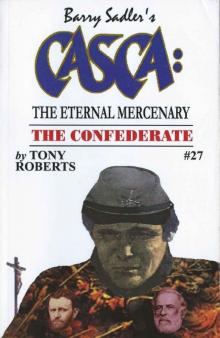 The Confederate
The Confederate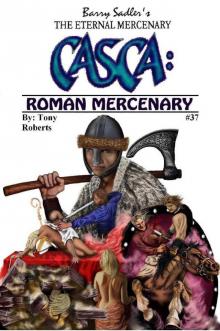 Roman Mercenary
Roman Mercenary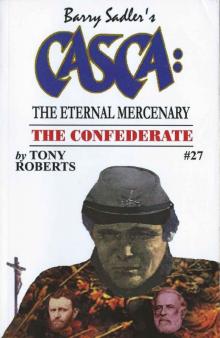 Casca 27: The Confederate
Casca 27: The Confederate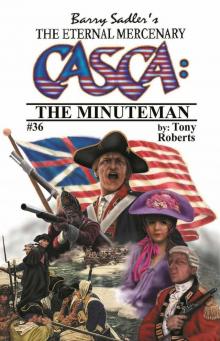 Casca 36: The Minuteman
Casca 36: The Minuteman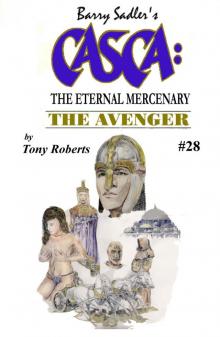 Casca 28: The Avenger
Casca 28: The Avenger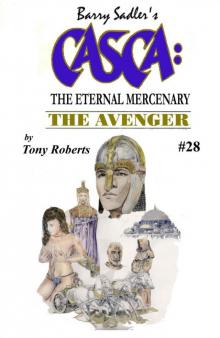 The Avenger
The Avenger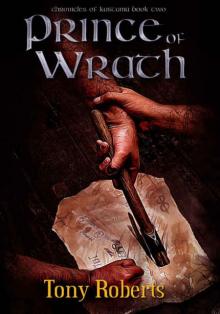 Prince of Wrath
Prince of Wrath